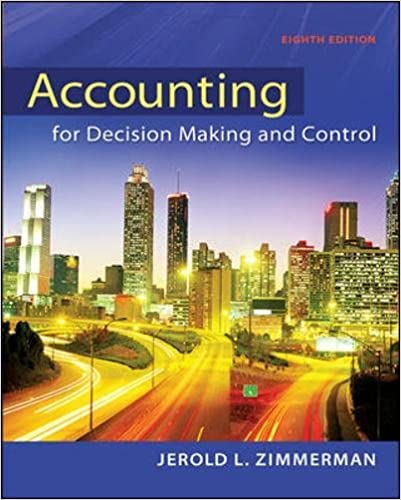
Accounting for Decision Making and Control 8th Edition by Jerold Zimmerman
Edition 8ISBN: 978-0078025747
Accounting for Decision Making and Control 8th Edition by Jerold Zimmerman
Edition 8ISBN: 978-0078025747 Exercise 21
Xerox
An October 25, 1999, article in BusinessWeek by D. Brady, "Why Xerox Is Struggling," reported:
President and Chief Executive G. Richard Thoman is a big-picture guy. For the past two years, he has preached a digital revolution at the copier giant. Get down to the detail, though, and it's clear that the revolution isn't going as planned: In both copiers and printers, Xerox is losing ground. On October 18, the company announced lower than expected earnings and the stock price tumbled more than 13% on that day. Xerox stock is down 60% from its recent high of $60 in July. Xerox blamed the bad news on short-term surprises: sagging productivity in the sales force after a big reorganization as well as weakness in Brazil. But the sheer scope of bad news shocked even Thoman, who told investors in a conference call that he was "disappointed and sad about this quarter."
Thoman took the top job in April and vowed annual earnings growth in the "mid-to-high teens."
Beginning November 1, 1999, Xerox factories increased their hours from five eight-hour days a week to six ten-hour days a week through the end of the year. The factory managers were told to build inventories in expectation of higher sales in the fourth quarter of 1999. Fourth-quarter sales were expected to be higher because of anticipation that the new sales force reorganization would increase sales.
Required:
Offer an alternative reason(s) for Xerox's decision to increase output in its factories.
An October 25, 1999, article in BusinessWeek by D. Brady, "Why Xerox Is Struggling," reported:
President and Chief Executive G. Richard Thoman is a big-picture guy. For the past two years, he has preached a digital revolution at the copier giant. Get down to the detail, though, and it's clear that the revolution isn't going as planned: In both copiers and printers, Xerox is losing ground. On October 18, the company announced lower than expected earnings and the stock price tumbled more than 13% on that day. Xerox stock is down 60% from its recent high of $60 in July. Xerox blamed the bad news on short-term surprises: sagging productivity in the sales force after a big reorganization as well as weakness in Brazil. But the sheer scope of bad news shocked even Thoman, who told investors in a conference call that he was "disappointed and sad about this quarter."
Thoman took the top job in April and vowed annual earnings growth in the "mid-to-high teens."
Beginning November 1, 1999, Xerox factories increased their hours from five eight-hour days a week to six ten-hour days a week through the end of the year. The factory managers were told to build inventories in expectation of higher sales in the fourth quarter of 1999. Fourth-quarter sales were expected to be higher because of anticipation that the new sales force reorganization would increase sales.
Required:
Offer an alternative reason(s) for Xerox's decision to increase output in its factories.
Explanation
Absorption costing
Under absorption cos...
Accounting for Decision Making and Control 8th Edition by Jerold Zimmerman
Why don’t you like this exercise?
Other Minimum 8 character and maximum 255 character
Character 255


